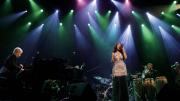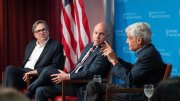By Stephen E. Frank, Harvard Law School '04
On this very day, not quite a decade ago, a fresh-faced Harvard College graduate stood right here and spoke of a woman whose life had been an inspiration to him. He spoke of her youthful determination to become a doctor, and of how that goal was nipped in the bud by the Holocaust that engulfed her homeland and much of her family. And he spoke of how this woman, late in life, finally fulfilled her dream. At the age of 56, she enrolled in medical school, and by 60 she was practicing medicine.
The message of that story was that on Commencement Day, as we celebrate our academic achievements, we are graduating to a life of learning—a life in which we are never too old to embrace our dreams. Commencement shouldn’t represent the end of our education. It should—as the word implies—represent a new beginning.
That message was personified nine years ago by a 91-year-old woman whose life was a testament to the power of learning. That woman was my grandmother. On that Commencement Day, the graduation speech she was here to attend was my own.
This year, my grandmother would have turned 100. Today, I feel her presence here in spirit. And the memory of her life continues to inspire me.
A few years ago, I told my grandmother I was considering giving up my journalism career, which some friends told me would be a mistake, and going back to school to study law. She told me: “Don’t listen to them. Do what you think is right.” That was a sentiment my grandmother took to heart. After she fled Nazi Germany and landed in what was then Palestine in the mid-1930s, she saw dozens of out-of-work Jewish physicians who, despite their predicament, refused to treat Arab patients. My grandmother knew that wasn’t right. And so she learned to speak Arabic, and my grandparents welcomed those patients into their home.
That lesson—the importance of using our education to stand firm against intolerance and injustice—is one that those who have gone before us at this University have a proud tradition of upholding. Standing firm against injustice is what retired Judge John Gibbons, a 1950 graduate of Harvard Law School, did just a few months ago, when he argued before the U.S. Supreme Court in the case of the hundreds of foreign citizens detained without trial at Guantanamo Bay. Judge Gibbons is a Republican. But he didn’t let politics get in the way of challenging those detentions as violations of the rule of law.
Standing firm against intolerance is what this University’s former general counsel, Margaret Marshall, did this past year, when she wrote the decision on behalf of the Massachusetts Supreme Judicial Court in Goodridge vs. the Department of Public Health, the case that legalized same-sex marriage here in Massachusetts.
And standing firm against injustice is what Harvard did earlier this year, when it protested poorly designed immigration policies that have made it increasingly difficult for international students to attend American universities. Those policies cite security as their goal. Yet they often do little to protect us, even as they thwart the legitimate ambitions of students and scholars around the world, and hamper efforts to use education to build bridges across cultures.
Those of us who graduate today face no shortage of opportunities to combat injustice in our own way. For some of us, the fight might mean taking up age-old struggles, like those against poverty and hunger. Or it might mean struggling against new manifestations of intolerance, such as the recent effort to write discrimination into the Constitution of the United States. Whatever form the battle takes, we set out well-equipped to fight it. Like my grandmother, and like those who gone forth from this place before us, all we need is a sense of what is right—and the determination to persevere.
Not far from Harvard Yard, Henry Wadsworth Longfellow once wrote:
Life is real! Life is earnest! / And the grave is not its goal; / Dust thou art, to dust returnest, / Was not spoken of the soul. / Not enjoyment, and not sorrow, / Is our destined end or way; / But to act, that each to-morrow / Find us farther than to-day. …. In the world’s broad field of battle, / In the bivouac of Life, / Be not like dumb, driven cattle! / Be a hero in the strife! …. Lives of great men all remind us / We can make our lives sublime, / And, departing, leave behind us / Footprints on the sands of time.
Today, let us not be afraid to act. Let us go forth from here, and let us take the first step.





